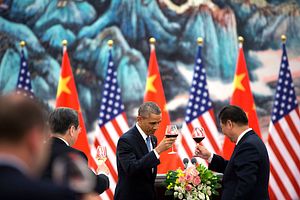The usual script for a balanced assessment of U.S.–China relations is to declare it the most important bilateral relationship in the world, to note impressive economic integration and alignment of interests, and to praise high-volume “people-to-people” ties—all before moving on to what everyone wants to hear about, the challenge of beating the so-called Thucydides trap and avoiding strategic rivalry and World War III. Depending on the writer’s inclination, the script ends with recommendations either on how to avoid rivalry and war, or how to prepare for an eventual conflict so that one’s own side might prevail.
Recent events (and the U.S. Thanksgiving holiday spirit) call for an inversion of that script, so allow me to briefly describe the peril of our times before explaining why people in the United States, China, and everywhere should be thankful for the current state of U.S.–China ties.
Strategic distrust between political elites in both countries has not improved significantly since leading voices Kenneth Lieberthal and Wang Jisi published their landmark essay on the problem in 2012. In the South China Sea, U.S. and Chinese military planners seem settled into a tit-for-tat cycle of increased deployments and activities designed to demonstrate each government’s view of the region—a cycle that could lead to accident, miscalculation, and escalation. Despite untested assurances that both governments oppose commercial hacking, bilateral competition for military-strategic superiority in cyberspace continues unabated. There are even signs of increasing discord on economic issues, with Chinese moves potentially hurting U.S. market access and U.S. policymakers appearing to fight Chinese influence in the world.
These could be dangerous times indeed. Still, there are undercurrents that require our attention, overlooked storylines that mitigate risk and provide opportunities for U.S., Chinese, and others to work toward common interests.
One positive development is the discussion of the Thucydides trap itself, confronting the possibility that an established great power and a rising power might come into conflict for structural reasons. While the observation that conflict arose in 12 of 16 analogous cases is statistically meaningless and tells us little about today’s U.S.–China case, we should be thankful that U.S. and Chinese elites are spending time thinking about how to avoid structural conflict. Though it may be a bitter pill for skeptical Washington commentators, we should also be thankful for President Xi Jinping’s formulation of a “new model of major country relations,” which also seeks to avoid great power rivalry. Even Lieberthal and Wang’s haunting essay is a sign that conscientious thinkers are seeking a positive way forward.
The South China Sea, a focus of strategic suspicion and geopolitical competition between the United States and China in recent years, is nonetheless a place where we can be thankful that concerted bilateral efforts have paid off. At a time when state and non-state actors are in conflict or at deadly cross-purposes in the Middle East and North Africa, U.S. and Chinese military officials have mostly maintained professional conduct even while tasked with opposing objectives. While “strategic” or long-term trust is low, tactical or in-theater trust has been significantly increased between the two navies. Even after a U.S. ship recently undertook a direct challenge to China’s activities, the ship’s commander reported professional and friendly contact by radio with Chinese forces.
Even if a global climate deal is revealed to be out of reach, we should be thankful for bilateral efforts to address global climate change through the diplomatic pageantry of jointly announcing each country’s potential contribution.
We should even be thankful that, while risk and uncertainty still dominate in cyberspace, the U.S. and Chinese governments are potentially moving toward discussion of international norms and realistic efforts regarding strategic stability where there is none today.
These recent developments show that governments have not avoided the tasks of managing conflicting strategic interests and developing stability-enhancing modes of communication and cooperation. Everyone involved knows that these efforts could be overshadowed by a catastrophe, but everyone involved regards a slip into conflict or instability as the result of unpredictable domestic, bilateral, or international events as catastrophic.
This common purpose in pursuing stability should not be met with cynicism or accusations of appeasement, but rather with our thanks that the present governments are struggling against the impulse toward rivalry present in each country’s strategic culture.
Perhaps the easiest fact to be thankful for in U.S.–China relations is that, on almost every conceivable variable, things could very easily be worse. The two interconnected economies could have fared worse during the financial crisis. An incident at sea or in the air might have occurred without common purpose and protocols for unplanned encounters. One or both of the two countries could be led by individuals who embrace, not detest, the possibility of Cold War–style strategic rivalry. Educational exchange and personal contact could have dropped drastically in these alternate worlds, undermining the intuitive understanding that the other country is full of people just like us.
And while you won’t find this writer habitually praising political leaders, who inevitably have much to answer for and much to improve upon, we should be thankful for the human effort displayed on both sides as individuals in government and society navigate the challenges that arise and try to seize opportunities for constructive efforts on global problems.
Graham Webster (@gwbstr) is a researcher, lecturer, and senior fellow of The China Center at Yale Law School, who will be back to chronicling the bad and the ugly next week in his free e-mail brief, U.S.–China Week.

































